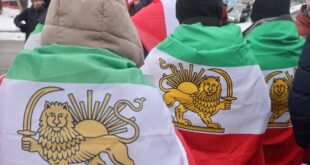Iranian Foreign Ministry Spokesman Seyed Mohammad Ali Hosseini stressed his country’s insistence on the right to access civilian nuclear technology for peaceful purposes, underlining that Tehran has not changed its nuclear stances. Hosseini made the remarks during his weekly press conference here on Sunday and in response to questions about Iran’s reaction to the time-out plan proposed by the International Atomic Energy Agency (IAEA) Director General Mohamed ElBaradei.
“We will fulfill whatever we have accepted within the framework of the modality agreement with the Agency,” he said, adding that the remaining issues between Iran and the IAEA would be discussed in future talks with the UN nuclear watchdog agency.
The spokesman underlined Tehran’s continued cooperation with the IAEA, but meantime warned that if the UN Security Council embarks on passing a resolution against Iran, “the Islamic Republic will reconsider its cooperation with the IAEA.”
He further pointed to the upcoming meeting of the IAEA’s Board of Governors, and expressed the hope that the Board would pay due attention to ElBaradei’s latest report and positions on Iran and make decisions on the basis of the existing realities.
The spokesman also said that Tehran has dispatched several delegations to consult with all the member states of the Board of Governors, adding that the delegates will brief the board members about Iran’s cooperation with the UN nuclear watchdog.
Asked about implementation of the Non-Proliferation Treaty (NPT) additional protocol by Iran, Hosseini said the case is not on Tehran’s agenda at the present juncture, reminding that the parliament had ordered the government to stay away from any kind of voluntary measure as long as Iran’s nuclear dossier is studied at the UN Security Council.
Elsewhere, he responded to questions about the latest conditions of Iran’s first nuclear power plant in the southern port city of Bushehr, and rejected reports on having disagreements with Russia over completion of the joint nuclear power plant.
“Our negotiations with Russia are positive and progressing and Russian officials at the highest level have assured us that the Bushehr plant will be completed,” Hosseini said.
Iran’s chief nuclear negotiator Ali Larijani said on Thursday that Iran has agreed with Russia on fixing a timetable for nuclear fuel delivery to Bushehr.
Iran’s presidential press chief Ali-Akbar Javanfekr had last week told the Russian daily Gazeta that although Iran was interested in having Russia finish the plant, it was considering other candidates as well.
Tehran officials however later modified Javanfekr’s remarks and said the country would still trust Russia in completing the Bushehr plant.
The Iranian-Russian joint project was originally supposed to be completed at the beginning of the millennium but has been delayed at least five times for various reasons.
Meantime, Hosseini said that no exact time can be set for the completion of the Bushehr nuclear project, adding that a committee is studying the issue.
He also reminded that completion of the project “is now a technical issue” and that it is impossible to set an exact time for it until the issue is finalized.
Asked about the fate of a US former Federal Bureau of Investigation (FBI) agent, who reportedly disappeared while visiting the Islamic republic six months ago, Hosseini said Tehran was still seeking clues in this regard.
The fate of Robert Levinson, who, Washington says, went missing in March while on a private visit to Iran’s southern island of Kish, has remained a mystery ever since, with Iran insisting it has no information about him.
“The Iranian authorities are seeking to find traces of him, and the officials’ efforts are ongoing,” Hosseini told reporters.
Iran has always said it had no record of Levinson even entering the country.
Levinson’s wife said last month she wanted to visit Iran to search for her husband, a request that, at the time, the authorities said they were willing to consider.
But the Iranian spokesman stressed that Tehran is not in receipt of any visa application by Levinson’s wife.
“According to our follow-ups, no visa application has been filled,” he said.
Hosseini said that “information” requested by the Americans had been sent to the Swiss embassy in Tehran, which represents US interests in Iran in the absence of a US mission.
“They also requested to travel to Kish, and Iranian officials want them to provide the reasons why such a trip is necessary, while our own forces are pursuing the case,” said Hosseini.
 Eurasia Press & News
Eurasia Press & News



